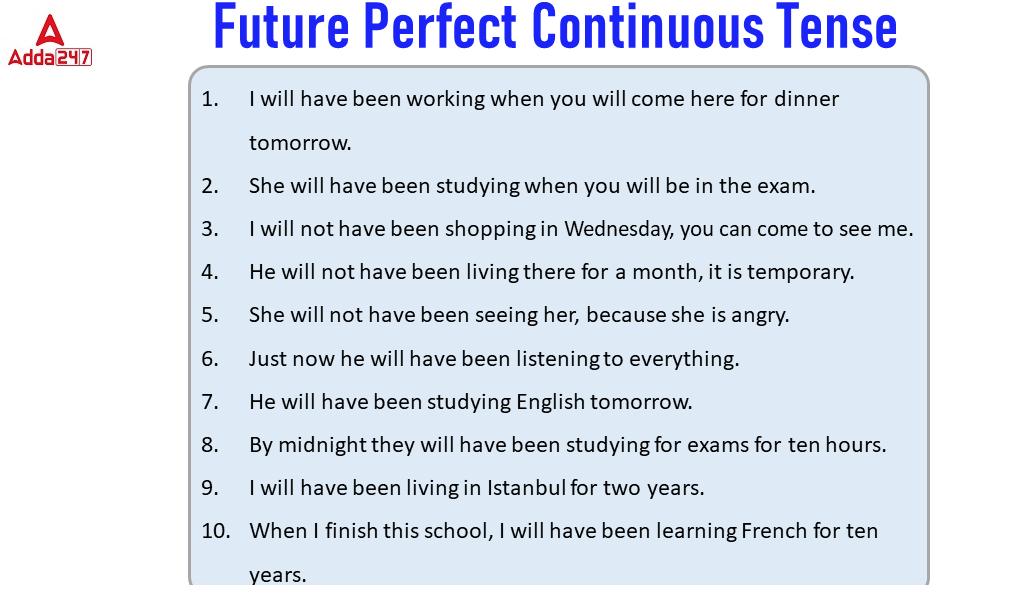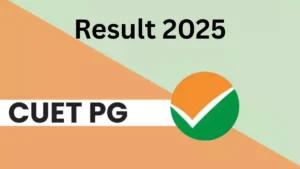Table of Contents
The future perfect continuous form of tense is a unique and somewhat advanced tense in English grammar. It is used to describe actions or events that will have been ongoing for a certain period of time in the future. This tense is formed by combining elements of the future tense, the perfect tense, and the continuous (progressive) tense. In this article, we will explore the definition, formula, structure, rules, examples, and exercises of this unique tense.
Future Perfect Continuous Tense
The future perfect continuous tense or the future perfect progressive tense is a verb tense that can be used to talk about an action that will go on until a particular point in the future. As it expresses an activity or occurrence that will be moving to a particular point in the future, the future perfect continuous form of tense is also known as the future perfect progressive tense. Let us know about the formal definition of this tense.
Future Perfect Continuous Definition
The Future Perfect Continuous form of Tense, as defined by the Cambridge Dictionary, is a tense type used “when we are looking back to the past from a point in the future and we want to underline the length or duration of an activity or event.”
Future Perfect Continuous Tense Formula
Here is the explanation of how to use the future perfect progressive tense formula and what is the Structure of the Future Perfect Continuous form of Tense . What will help you is understanding the basic formula you can use to create future perfect progressive tense sentences. The future perfect progressive tense formula is given here.
| Subject + will have + been + present participle (verb+ing) + since/for (if needed) + object. |
Analysis of sentence construction in the positive, negative, interrogative, and negative interrogative formats is also important, in addition to knowing the formula.
Future Perfect Continuous Tense Structure
| Positive/Affirmative: Subject + will have + been + present participle (verb+ing) + since/for (if needed) + object. |
| Negative: Subject + will+ not+ have+been + present participle (verb+ing) + since/for (if needed) + object. |
| Interrogaive: Will+ Subject + have + been + present participle (verb+ing) + since/for (if needed) + object? |
| Negative Interrogative: Will+ Subject + not+ have+ been + present participle (verb+ing) + since/for (if needed) + object? |
Positive/Affirmative: Subject + will have + been + present participle (verb+ing) + since/for (if needed) + object.
- She will have been waiting here for three hours by seven o’clock.
- By 2022 I will have been living in London for sixteen years.
- When I finish this course, I will have been learning English for twenty years.
- Next year he will have been working here for four years.
Negative: Subject + will+ not+ have+been + present participle (verb+ing) + since/for (if needed) + object.
- She will not have been waiting here for three hours by seven o’clock.
- By 2022 I will not have been living in London for sixteen years.
- When I don’t finish this course, I will not have been learning English.
- Next year he will not have been working here.
Interrogaive: Will+ Subject + have + been + present participle (verb+ing) + since/for (if needed) + object?
- Will she have been waiting here for three hours by seven o’clock?
- By 2022, will I have been living in London for sixteen years?
- When I finish this course, Will I have been learning English for twenty years?
- Next year will he have been working here for four years?
Negative Interrogative: Will+ Subject + not+ have+ been + present participle (verb+ing) + since/for (if needed) + object?
- Will she not have been waiting here for three hours by seven o’clock?
- By 2022, will I not have been living in London for sixteen years?
- When I finish this course, Won’t I have been learning English for twenty years?
- Next year won’t he have been working here for four years?
10 Real Life Future Perfect Continuous Tense
Here are 10 examples of real-life situations using the future perfect continuous tense:
By next month, I will have been working at this company for five years.
By 6 PM, she will have been studying for the exam for three hours.
By the time you arrive, we will have been waiting here for 30 minutes.
By December, they will have been living in this house for a decade.
By the end of the year, I will have been traveling for six months straight.
By this time tomorrow, he will have been running the marathon for five hours.
By the end of the meeting, they will have been discussing the project for over two hours.
By 2025, I will have been saving for my house for ten years.
By 8 o’clock, the kids will have been playing outside for two hours.
By the time you get back, I will have been cooking dinner for over an hour.
Each sentence reflects a future point when an action will already have been continuing for some time.
Future Perfect Continuous Since and For Uses
Since – Since is used when the exact point of time is given.
For example:
It has been raining since morning.
In the above example, a particular time is given which is morning so we have used ‘since’.
For – For is used when the exact point of time is not given, a period of time is there.
For example:
I have been living there for a month.
In the above example, a particular time is not given, it can be a full month or half month so we have used ‘for’ here.
Points to keep in mind while using Future Perfect Continuous Tense
It is a fact that the English language’s least often used tense is future perfect continuous. But since you never know when you might need to use the tense, it is always a good idea to learn how to use it. In order to avoid confusion, remember that the future perfect continuous form of tense comprises three auxiliary verbs: will, have, and been, each of which is followed by the present participle form of the main verb. Also keep in mind that only action verbs, not stative verbs, can be used with the future perfect progressive tense.
When to use Future Perfect Continuous Tense?
The following scenarios can be best represented using the Future Perfect Continuous form of Tense:
- To indicate a current action or event that will continue until a specific time in the future or another occurrence.
- To show a past action or occurrence that linked to a present action or event that will occur in the future.
Exercises on Future Perfect Continuous Tense
Fill in the blanks with the right form of the future perfect continuous form of tense in the following sentences:
1. Sam and Quinn will definitely not be that exhausted when they get here as they ______________ (drive – negative) for so long.
2. Vinita _______________ (walk) around for hours.
3. How long ______ they ______________ (play – interrogative) the guitar next year?
4. Next week, Tharun _________________ (work – negative) for more than a year.
5. In November, Devika _________________ (teach) at this school for three years.
6. We are late. I guess Aldrin and Sam ______________ (wait) for us.
7. Ashwin will be very tired when he gets home as he ______________ (exercise) for over an hour.
8. ________ Neelaveni Ma’am ____________ (train – negative interrogative) students for more than twenty years at the end of this academic year?
9. ________ you _______________ (live – interrogative) in Australia for over a year when you finish your studies?
10. When you come at 8 p.m, __________ they ______________ (practise) long enough?
The answers to the above questions are given below. Go through them to check out how far you have understood the topic.
1. Sam and Quinn will definitely not be that exhausted when they get here as they will not have been driving for so long.
2. Vinita will have been walking around for hours.
3. How long will they have been playing the guitar next year?
4. Next week, Tharun will not have been working for more than a year.
5. In November, Devika will have been teaching at this school for three years.
6. We are late. I guess Aldrin and Sam will have been waiting for us.
7. Ashwin will be very tired when he gets home as he will have been exercising for over an hour.
8. Won’t Neelaveni Ma’am have been training students for more than twenty years at the end of this academic year?
9. Will you have been living in Australia for over a year when you finish your studies?
10. When you come at 8 p.m, will they have been practising long enough?
Future Perfect Continuous Tense in Hindi
फ्यूचर परफेक्ट कंटीन्यूअस टेंस एक क्रिया काल है जिसका उपयोग किसी क्रिया के बारे में बात करने के लिए किया जा सकता है जो भविष्य में किसी विशेष बिंदु तक चलेगा। जैसा कि यह एक गतिविधि या घटना को व्यक्त करता है जो भविष्य में एक विशेष बिंदु पर जा रहा होगा, भविष्य के पूर्ण निरंतर काल को भविष्य के पूर्ण प्रगतिशील काल के रूप में भी जाना जाता है।
फ्यूचर परफेक्ट कंटीन्यूअस टेंस की परिभाषा
कैम्ब्रिज डिक्शनरी द्वारा परिभाषित फ्यूचर परफेक्ट कंटीन्यूअस टेंस, एक तनावपूर्ण प्रकार है जिसका उपयोग “जब हम भविष्य में एक बिंदु से अतीत की ओर देख रहे होते हैं और हम किसी गतिविधि या घटना की लंबाई या अवधि को रेखांकित करना चाहते हैं।”
फ्यूचर परफेक्ट कंटीन्यूअस टेंस की संरचना और सूत्र
फ्यूचर परफेक्ट कंटीन्यूअस टेंस फॉर्मूला और फ्यूचर परफेक्ट कंटीन्यूअस टेंस की संरचना क्या है, इसका विवरण यहां दिया गया है। भविष्य में सही निरंतर तनाव वाक्य बनाने के लिए आप जिस मूल सूत्र का उपयोग कर सकते हैं उसे समझने में आपकी क्या मदद मिलेगी। फ्यूचर परफेक्ट कंटीन्यूअस टेंस फॉर्मूला यहां दिया गया है।
विषय + होगा + वर्तमान कृदंत (क्रिया + आईएनजी) + तब से/के लिए (यदि आवश्यक हो) + वस्तु।
सूत्र जानने के अलावा, सकारात्मक, नकारात्मक, प्रश्नवाचक और नकारात्मक प्रश्नवाचक स्वरूपों में वाक्य निर्माण का विश्लेषण भी महत्वपूर्ण है।
इस लिंक पर क्लिक करके Adda247 सक्षम बैच में शामिल हों.
फ्यूचर परफेक्ट टेंस की संरचना
सकारात्मक/सकारात्मक: विषय + होगा + वर्तमान कृदंत (क्रिया + आईएनजी) + तब से/के लिए (यदि आवश्यक हो) + वस्तु।
नेगेटिव: सब्जेक्ट + विल + नॉट + हैव + प्रेजेंट कृदंत (क्रिया + आईएनजी) + तब से/के लिए (यदि आवश्यक हो) + ऑब्जेक्ट।
प्रश्नवाचक: विल+ विषय + रहा है + वर्तमान कृदंत (क्रिया+आईएनजी) + तब से/के लिए (यदि आवश्यक हो) + वस्तु?
नकारात्मक प्रश्नवाचक: क्या + विषय + नहीं+ गया है + वर्तमान कृदंत (क्रिया+आईएनजी) + तब से/के लिए (यदि आवश्यक हो) + वस्तु?
नोट: होगा+नहीं=नहीं होगा
Future Perfect Continuous Tense Examples in Hindi
फ्यूचर परफेक्ट टेंस उदाहरण
सकारात्मक/सकारात्मक: विषय + होगा + वर्तमान कृदंत (क्रिया + आईएनजी) + तब से/के लिए (यदि आवश्यक हो) + वस्तु।
वह सात बजे तक तीन घंटे से यहीं इंतजार कर रही होगी।
2022 तक मैं लंदन में सोलह साल से रह रहा होगा।
जब मैं इस कोर्स को पूरा कर लूंगा, तो मैं बीस साल से अंग्रेजी सीख रहा होगा।
अगले साल वह चार साल से यहां काम कर रहा होगा।
नेगेटिव: सब्जेक्ट + विल + नॉट + हैव + प्रेजेंट कृदंत (क्रिया + आईएनजी) + तब से/के लिए (यदि आवश्यक हो) + ऑब्जेक्ट।
वह सात बजे तक तीन घंटे से यहाँ इंतज़ार नहीं कर रही होगी।
2022 तक मैं सोलह साल से लंदन में नहीं रह रहा होगा।
जब मैं इस कोर्स को पूरा नहीं करता, तो मैं अंग्रेजी नहीं सीख रहा होता।
अगले साल वह यहाँ काम नहीं कर रहा होगा।
प्रश्नवाचक: क्या + विषय + रहा + वर्तमान कृदंत (क्रिया + आईएनजी) + तब से/के लिए (यदि आवश्यक हो) + वस्तु?
क्या वह सात बजे तक तीन घंटे से यहाँ इंतज़ार कर रही होगी?
2022 तक, क्या मैं सोलह साल से लंदन में रह रहा होगा?
जब मैं इस कोर्स को पूरा कर लूंगा, तो क्या मैं बीस साल से अंग्रेजी सीख रहा हूं?
क्या वह अगले साल चार साल से यहां काम कर रहा होगा?
नकारात्मक प्रश्नवाचक: क्या + विषय + नहीं+ गया है + वर्तमान कृदंत (क्रिया+आईएनजी) + तब से/के लिए (यदि आवश्यक हो) + वस्तु?
क्या वह सात बजे तक तीन घंटे से यहाँ प्रतीक्षा नहीं कर रही होगी?
2022 तक, क्या मैं सोलह साल से लंदन में नहीं रह रहा होता?
जब मैं इस कोर्स को पूरा कर लेता हूँ, तो क्या मैं बीस साल से अंग्रेजी नहीं सीख रहा हूँ?
अगले साल क्या वह यहाँ चार साल से काम नहीं कर रहा होगा?



 CUET PG Result 2025 Soon @exams.nta.ac.i...
CUET PG Result 2025 Soon @exams.nta.ac.i...
 NEET Admit Card 2025 Release Date, How t...
NEET Admit Card 2025 Release Date, How t...
 CUET UG 2025 Vs CUET UG 2024, Check Majo...
CUET UG 2025 Vs CUET UG 2024, Check Majo...










